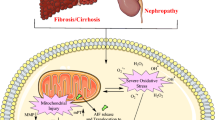Summary
The regulating mechanism in hepatic injury caused by obstructive jaundice (OJ) was examined in this study. Rat hepatocytes were harvested byin situ collagenase perfusion and subjected to primary culture. The heptocytes were pre-treated with various concentrations of protein kinase C (PKC) agonist PMA and its inhibitor chelerythrine and cultured for 20 min. After the treatment, 50 μmol/L glycochenodeoxycholate (GCDC) was added and the cells were cultured for an additional 24 h. Cells were then detected by flow cytometry (FCM) and TUNEL. After hepatocytes were treated with different concentrations of fructose and 100 μM GCDC, the cells were examined by FCM and TUNEL. Experimental obstructive jaundice (BDL) was induced by double ligation of the bile duct. After BDL, the rats were fed with or without fructos and sacrificed 3, 7, 14 and 21 days after the ligation. The apoptotic status was observed in liver of all rats with TUNEL and PKC protein in liver of OJ was studied by immunohistochemical method. Our results showed that PMA increased GCDC-induced apoptosis and chelerythrine decreased GCDC-induced apoptosis in a concentration-dependent manner. After the treatment with fructose of different concentrations, 100 μM GCDC decreased the apoptotic rate and the apoptotic rate decreased with the increase of fructose concentration. The apoptotic rate of liver was related to the time of OJ. Without the treatment of fructose, PKC and apoptosis index (AI) were highest 14 days after the bile duct ligation. With the treatment of fructose, apoptosis index (AI) and PKC were decreased from the 14th day after the bile duct ligation. It is concluded that PKC is involved in the regulation of apoptosis in the liver cells with OJ and plays important roles in the development and progression of liver injury caused by OJ. Fructose can protect hepatocytes in the bile salt-induced apoptosis by regulating PKC.
Similar content being viewed by others
References
Lee J I, Lee K S, Paik Y Het al. Apoptosis of hepatic stellate cells in carbon tetrachloride induced acute liver injury of the rat: analysis of isolated hepatic stellate cells. J Hepatol, 2003, 39 (6): 960
Canbay A, Higuchi H, Bronk S Fet al. Fas enhances fibrogenesis in the bile duct ligated mouse: a link between apoptosis and fibrosis. Gastroenterology, 2002, 123 (4): 1323
Ruiz M C, Izquierdo M, Murcia Get al. Activation of protein kinase c attenuates early signals in tas-mediated apoptosis. Eur J Immunol, 1997, 27 (11): 1442
Lang D, Terstesse M, Dohle Fet al. Protein kinase C (PKC) dependent induction of tissue factor (TF) by mesangial cells in response to inflammatory mediators and release during apoptosis. Br J Pharmacol, 2002, 137 (7): 1116
Spirey J, Bronk S F, Gores G J. GCDC induced lethal hepatocellular injury in rat hepatocytes: Role of ATP depletion and cytosolic free calcium. J Clin Invest, 1993; 92 (1): 17
Guicciardi M E, Gores G J. Bile acid-mediated hepatocyte apoptosis and cholestatic liver disease. Dig Liver Dis, 2002, 34 (6): 387
Patel T, Bronk S F, Gores G F. Apoptosis and hepatobiliary disease. Hepatology, 1995, 21 (9): 1725
Webb P R, Wang K Q, Scheel Det al. Regulation of neutrophil apoptosis: a role for protein kinase C and phosphatidylinositol-3-kinase. Apoptosis, 2000, 5 (5): 451
Blake A, Jones A, Rao Yet al. Bile salt induced apoptosis of hepatocytes involves activation of protein kinase C. Am J Physiol, 1997, 272 (5): 1109
Barrett C M, Lewis F L, Roaten J Bet al. Novel extranuclear-targeted anthracyclines override the antiapoptotic functions of Bcl-2 and target protein kinase C pathways to induce apoptosis. Mol Cancer Ther, 2002, 1 (7): 469
Rivadeneira D E, Grobmyer S R, Naama H Aet al. Malnutrition-induced macrophage apoptosis. Surgery, 2001, 129 (5): 617
Alpini G, Baiocchi L, Glaser Set al. Ursodeoxycholate and tauroursodeoxycholate inhibit cholangiocyte growth and secretion of BDL rats through activation of PKC alpha. Hepatology, 2002, 35 (5): 1041
Author information
Authors and Affiliations
Additional information
Wang Jianming, male, born in 1968, Associate Professor
This project was supported by a grant from Scientific Foundation of Hubei Province (No. 2002AA301C30).
Rights and permissions
About this article
Cite this article
Jianming, W., Hui, W., Baolai, X. et al. Roles of protein kinase C and fructose in hepatic injury caused by obstructive jaundice. J. Huazhong Univ. Sci. Technol. [Med. Sci.] 25, 435–438 (2005). https://doi.org/10.1007/BF02828216
Received:
Issue Date:
DOI: https://doi.org/10.1007/BF02828216




